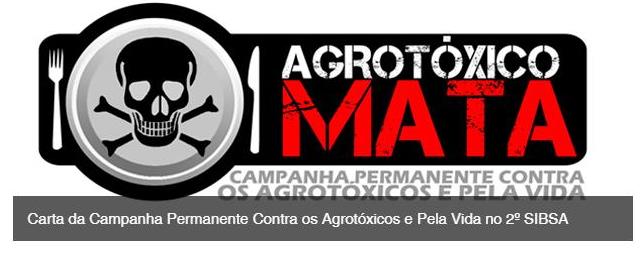Letter from the Permanent Campaign Against the Pesticides and for life in the 2nd SIBSA
Notícia publicada em:
- 5 de Novembro de 2014
The Permanent Campaign Against the Pesticides and for life calls for mobilization for world day of no use of pesticides, on December 3rd
The 2nd Brazilian Symposium on Health and Environment brought together academia, public administration and social movements to discuss the theme “Development, Territorial Conflicts and Health: Science and Social Movements for Environmental Justice in Public Policies”. The symposium had 25 works related to the issue of pesticides, whether in the complaint of its health effects, or in the possibilities of overcoming the chemical-dependent model imposed by the agribusiness through agroecology.
The Permanent Campaign Against the Pesticides and for life has been present since the organization of the meeting until the participation in workshops, roundtables and discussion groups. The assessment of the situation related to theme shows that, regardless of the outcome of the presidential election, the ruralist representatives are stronger than before and will press for approval of their agendas. Chief among them will be PEC 215, which passes to the legislature the power of demarcation of indigenous lands. The deregulation of pesticide legislation, facilitating the registration of more poisons and transgenics, is also on the priorityof the ruralist agenda . At the same time, experiences of agroecology spread in Brazil, as onecan see by the conferences and meetings of agroecology, which year by year have been gaining strength.
In this context, we, wrestlers and fighters against the poisons and for life, understand that the issue of pesticides remains the main contradiction of agribusiness in Brazil and we affirm that:
– Contamination by pesticides in water is today one of the main issues to be faced. Despite the profound ignorance about the situation, the few analyses over a small set of active principles indicate a high degree of contamination in aquifers and waterways. The analysis of residues of pesticides in water must observe the substances used at each site, as well as the period of application;
– Brazil follows using pesticides banned abroad. In this sense, it is urgent that Anvisa resume the process of reevaluation and banishment of at least 10 active ingredients, banned in other countries, where evidence of nonconformity with the national legislation was found;
– We must strengthen the creation of pesticide and transgenic-free zones, on the understanding that the cohabitation of agroecology and agribusiness is impossible;
– We must strengthen the role of Combating the Impacts of Pesticides fora, both in the States and in the federal scope, providing subsidies for actions of the public prosecutor in ensuring rights and in defense of life;
– Aerial spraying remains one of the main ways of contamination and must be prohibited as a matter of urgency;
In addition, we recognize as crucial the alliance between academia and social movements in the fight for a new model of society. The campaign against the Pesticides was born from this perspective, and today stands as an articulation capable of fostering an engaged citizen science and a scientifically based social struggle .
We invite any and all who will not accept the agrarian hegemonic model, dominated by transnationals of the poisons and seeds, to mobilize on 3rd December, celebrating the world day of no use of pesticides with indignation, courage, and hope in a world where food is fruit of the family peasant, agroecological and sovereign agriculture.
Permanent campaign against pesticides and for life
Source: www.abrasco.org.br





